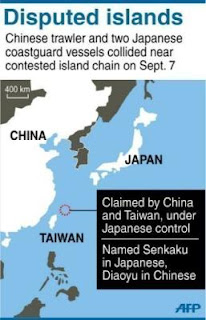Fishing Boat Incident & Border Dispute
However, the fuse was lit again this month when Japan seized a Chinese fishing boat near a disputed island chain in the East China Sea and the subsequent arrest of the captain. Japan government believes he intentionally rammed two Japanese vessels during a high-seas chase on September 7.
The islands in dispute--called Diaoyu in China, Senkaku in Japan-- are also claimed by Taiwan. They are uninhabited, but believed to have oil and gas deposits, and on rich fishing grounds.
This has escalated to the worst tensions in years between the top two economies in Asia. Beijing is furious, and had summoned Tokyo's ambassador five times in a week while scrapping talks over a joint energy exploration project in the East China Sea.
An Eerie Reminder of The 9-18 Incident
 |
| September 18th History Museum in Shenyang, China (via Wikipedia) |
For people unfamiliar with this part of the world history, the 9-18 Incident was a border dispute escalated into a military conflict between China and Japan on Sep. 18, 1931.
The 9-18 Incident took place near Shenyan City in Northern China, when the Imperial Japanese Army accused the Chinese of bombing a section of railroad owned by a Japanese company. It resulted in Japan taking over all major cities in three provinces of Northern China and setting up the puppet state by the Last Emporer of China - PuYi.
Saturday, September 18, 2010 is its 79th anniversary.
Currency War Already Waged
Actually, the fuse between the two countries was already getting shorter when China started buying Samurai bonds this year heading for a record annual increase. This propped up the yen, at a time when Japan--70% export dependent--is struggling with a slowing growth and a decade-long deflation.
In an article dated Sep. 9, Bloomberg BusinessWeek reported Japan’s government said it will seek discussions with China over the record purchases of Japanese bonds.
However, instead of a discussion, Japan initiated its first unilateral yen intervention in six years on Sep. 15. The surprise move immediately sent the US dollar, and the dollar-pegged Chinese yuan higher.
Network Hacking War – Not Yet
With the fish boat border dispute erupting so close to the anniversary of the 9-18 Incident, emotions are running high in China (as well as in Taiwan.) In addition to organized protests around mainland China, both Chinese and Japanese media reported Honker Union of China ((中國红客) had called on its members for a mass network attack of Japanese government sites.
Honker Union of China was formed in 2001 after a group of hackers brought down thousands of US websites in response to the collision of a US spy plane and a Chinese fighter jet over the South China Sea. The group is believed to have 12,000 members.
Some were anticipating a big showdown between the Chinese and Japanese hackers. However, China Hush reported that it was apparently a rumor as Honker Union of China posted a public notice on its web site denying a planned mass hacking attack against Japan.
(English translation courtesy of China Hush)
"The real war on the networks has no smoke and fire....Any attack will be executed silently, rather than vigorously promoting it.”China Hush also noted “Some said the rumor actually came from Japanese media, and it was deliberately reported to make China look bad…” Again, eerily similar to the Shenyang Incident seventy-nine years ago, where most believe the railroad sabotage was staged by Japan as a pretext for war.
History Repeating Itself?
The 9-18 Incident, which started not that differently from the recent tussles between China and Japan, is generally considered as the event officially unveiled the Second Sino-Japanese War (抗日戰爭) from 1937 to 1945, a very sad and cruel chapter of China's history, which has remained mostly very little mentioned and grossly under-represented in the Western and Japanese versions of the history book.
One would think Japan has enough on its economic front and would try very hard not to risk provoking China, which is an entirely different country from that of 79 years ago. But as the old saying goes, history tends to repeat itself with a short memory. The difference is that today’s interconnected world has made a full-blown actual military assault between two countries a less likely scenario.
Rather, the war between countries will be fought through currency and/or other monetary instruments, and stealth tech as intimated by the Honker Union’s message.
Static Chaos, Sept. 18, 2010

No comments:
Post a Comment
Note: Only a member of this blog may post a comment.